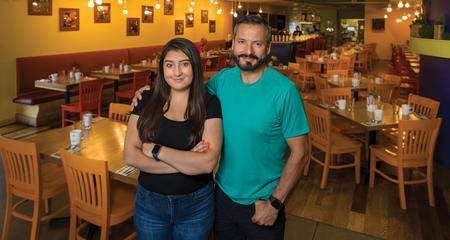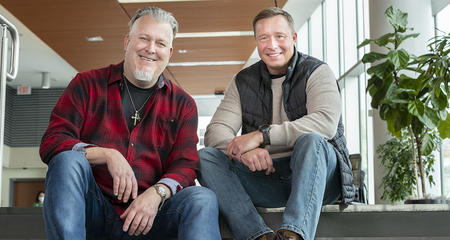Kyle Mandry held his flame-lit, golden torch high above his head while he ran to light the torch of the next runner a quarter of a mile ahead. It was the London 2012 Olympic Torch Relay, and the race, themed “Moment to Shine,” featured individuals with stories of journeys through hardship to victory. Just a couple of years before race day, in September 2010, Kyle, then 46, noticed blood in his stool and experienced irregular bowel movements. A colonoscopy revealed the bad news: Kyle had stage III rectal cancer, a disease about a third of diagnosed individuals do not survive.
After researching several academic medical institutions, Kyle and his family, who are from Menomonee Falls, Wis., chose Kirk Ludwig, MD, FACS, FASCRS, and the Froedtert & MCW Colorectal Cancer Program for Kyle’s care.
“It was important to us that I have expert care, and we were impressed by Dr. Ludwig’s training. I did my research and chose Froedtert because of the specialty program,” Kyle said.
Kyle started chemotherapy and radiation therapy right away. His cancer was located very low, close to his sphincter muscles, and the goal was to shrink the tumor and save function of those muscles. Throughout Kyle’s care, he benefitted from a multidisciplinary team approach with physicians who specialize in care designed to preserve function for patients who have tumors in this complicated location. Kyle’s regimen was aggressive: he received chemotherapy and radiation therapy every day for six weeks. Next, he had an eight-week break prior to surgery. During this break, the treatments continued to shrink the tumor.
On Feb 11, 2011, Dr. Ludwig and his team performed Kyle’s surgery, a low anterior resection with colonic J-pouch to anal anastomosis. During the operation, Kyle’s rectum was removed, but the anus was left intact. A portion of the remaining colon was then fashioned into a colonic pouch, and this “new rectum” was attached to the anus to allow normal bowel movements.
Kyle had a positive response to the surgery, was in the hospital for five days and went home to recover for five weeks. He had five months of chemotherapy afterward. An additional chemotherapy series followed the first. Kyle was treated once every two weeks with FOLFOX chemotherapy (Leucovorin Calcium, Fluorouracil, Oxaliplatin). In addition to Dr. Ludwig, Kyle had an entire team of experts helping him, including radiation oncologist Beth Erickson, MD, FACR, FASTRO, nurse practitioner Deborah Andris, MSN, APNP, and a team of additional specialists, including pharmacists, dietitians, nurses and others assigned to his care.
“I had an extremely positive experience at Froedtert; every point of the process, I had great care. They had me up and walking right away, because they knew it creates better outcomes. Dr. Erickson was so compassionate. Dr. Ludwig has this dry sense of humor that was great. It was especially helpful that my team knew and could prepare me for things that were going to happen ahead of time. ‘Ok, you’re going to hurt here in a few days,’ they would tell me. They were really fantastic,” Kyle said.
Now, Kyle has CT scans once per year, goes in every six months for blood work and has a colonoscopy every three years. He regularly volunteers as a counselor and mentor for others experiencing cancer to help them get through their diagnosis. He is on the board for the local “Get Your Rear in Gear” 5K race, a Colon Cancer Coalition event that raises awareness and funds for colorectal cancer. Kyle is now four years out from treatment with no sign of cancer, and in October 2016, he will officially be declared cancer-free.
Those who know Kyle agree that his positivity helped him through his treatments.
“His strength, commitment and positive attitude we have come to depend on never wavered - it only strengthened,” Kyle’s boss said in a letter nominating Kyle to carry the flame in the Olympic Torch Relay. “Kyle has truly inspired staff and clients this past year as he battled cancer. His year was filled with an aggressive treatment schedule, but to those of us who count on Kyle’s leadership, expertise and management, he rarely missed a beat. Although we were eager to assist, he was determined to minimize any impact on others.”
In 2012, just before race day in London, Kyle and his family met several other runners, who took turns sharing their stories. The people he ran with also had incredible stories of overcoming obstacles and helping others. “It was a very emotional and humbling event,” he said. “It was an incredible experience because of the people you are surrounded by. They were average people who have done much more incredible things than I have,” he said. Kyle was able to take his torch home and uses it as he speaks publicly at high schools and civic organizations, telling his story and raising awareness about the importance of colonoscopies and colorectal cancer screenings.



